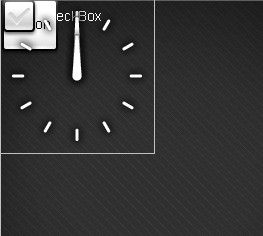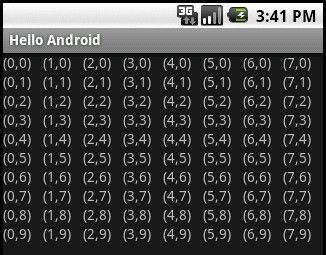android5种布局使用注意事项
AbsoluteLayout ,是一个按照绝对坐标定义的布局,由于使用绝对坐标去定位控件,因此要实现自适应界面时,应尽少使用 AbsoluteLayout 。
RelativeLayout-->最好在界面设计时 做好布局,尽少程序运行时 做控件布局的更改,因为 RelativeLayout布局里面的属性之间,很容易冲突
FrameLayout,顾名思义跟帧有关,布局里所有的控件都被放到布局的左上角,并且一层覆盖一层。
关键的是layout_gravity,负责控制控件的位置
TableLayout + TableRow是一组搭配使用的布局,TableLayout置底,TableRow在TableLayout的上面,而Button、TextView等控件就在TableRow之上,另外,TableLayout之上也可以单独放控件。经常在代码里使用TableLayout,例如做出表格的效果。
<?xml version="1.0" encoding="utf-8"?>
<LinearLayout xmlns:android="http://schemas.android.com/apk/res/android"
android:orientation="vertical"
android:layout_width="fill_parent"
android:layout_height="fill_parent"
>
<TableLayout
android:id="@+id/TableLayout01"
android:layout_width="fill_parent"
android:layout_height="wrap_content">
</TableLayout>
</LinearLayout>
package com.LayoutDemo;
import com.LayoutDemo.R;
import android.app.Activity;
import android.os.Bundle;
import android.view.ViewGroup;
import android.widget.TableLayout;
import android.widget.TableRow;
import android.widget.TextView;
public class LayoutDemo extends Activity {
/** Called when the activity is first created. */
private final int WC = ViewGroup.LayoutParams.WRAP_CONTENT;
private final int FP = ViewGroup.LayoutParams.FILL_PARENT;
@Override
public void onCreate(Bundle savedInstanceState) {
super.onCreate(savedInstanceState);
setContentView(R.layout.main);
//新建TableLayout01的实例
TableLayout tableLayout = (TableLayout)findViewById(R.id.TableLayout01);
//全部列自动填充空白处
tableLayout.setStretchAllColumns(true);
//生成10行,8列的表格
for(int row=0;row<10;row++)
{
TableRow tableRow=new TableRow(this);
for(int col=0;col<8;col++)
{
//tv用于显示
TextView tv=new TextView(this);
tv.setText("("+col+","+row+")");
tableRow.addView(tv);
}
//新建的TableRow添加到TableLayout
tableLayout.addView(tableRow, new TableLayout.LayoutParams(FP, WC));
}
}
}

